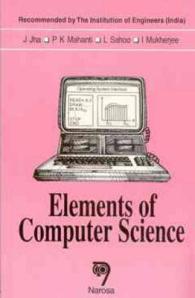- ホーム
- > 洋書
- > 英文書
- > Science / Mathematics
Full Description
Water Reuse: An International Survey of current practice, issues and needs examines water reuse practices around the world from different perspectives. The objective is to show how differently wastewater reuse is conceived and practised around the world as well as to present the varied needs and possibilities for reusing wastewater. In the first section water reuse practices around the world are described for regions having common water availability, reuse needs and social aspects.
The second section refers to the "stakeholders" point of view. Each reuse purpose demands different water quality, not only to protect health and the environment but also to fulfil the requirements of the specific reuse. Reuses considered are agricultural, urban agriculture as a special case of the former, municipal and industrial. Alongside these uses, the indirect reuse for human consumption through aquifer recharge is also discussed. The third section deals with emerging and controversial topics. Ethical and economical dilemmas in the field are presented as a subject not frequently addressed in this field. The role of governments in respect of public policy in reuse is discussed as well as the different international criteria and standards for reusing wastewater. The importance of public acceptance and the way to properly handle it is also considered.
The fourth section of the book presents contrasting case studies; typical situations in the developed world (Japan and Germany) are compared to those in developing countries (Pakistan and Brazil) for agricultural and industrial reuse. Indirect planned reuse for human consumption (Germany) is compared with an unplanned one (Mexico). The Windhoek, Namibia case study is presented to emphasize why if the direct reuse of wastewater for human consumption has been performed with success for more than 35 years it is still the only example of this type around the world. To illustrate the difficulties of having a common framework for regulating water reuse in several countries, the Mediterranean situation is described. Other case studies presented refer to the reuse situation in Israel, Spain, Cameroon, Nepal and Vietnam, these latter countries being located in water rich areas.
This book will be an invaluable information source for all those concerned with water reuse including water utility managers, wastewater policy makers and water resources planners as well as researchers and students in environmental engineering, water resources planning and sanitary engineering.
Scientific and Technical Report No. 20








